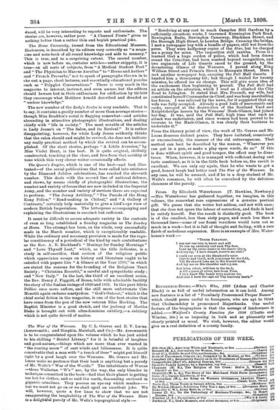The War of the Wenuses. By C. L. Graves and
E. V. Lucas. (Arrowsmith ; and Simpkin, Marshall, and Co.)—Mr. Arrowsmith is to be congratulated upon the volume which he has just added to his shilling "Bristol Library," for it is brimful of laughter and good-nature,—things which are more than ever wanted in "the roaring moon" of east winds and biliousness. It is quite conceivable that a man with "a touch of liver" might put himself right by a good laugh over the Wenuses. Mr. Graves and Mr. Lucas make no pretence that their book is anything but a parody of Mr. Wells's "War of the Worlds." The inhabitants of Wenns —these Wellerian " W's " are, by the way, the only blunder in technique committed in the book—find that their planet is getting too hot for clothes, and so raid the earth, descending enclosed in gigantic crinolines. They possess an eye-ray which mashesbut we must not go on or we shall spoil an excellent joke. We will, however, quote a few lines to show that we are not exaggerating the langhability of The War of the Wenuses. Here is a delightful parody of Mr. Wells's topographical style :— " Resolving at any cost to reach Campden Hill Gardens by a sufficiently circuitous route, I traversed Kennington Park Road, Newington Butte, Newington Causeway, Blackman Street, and the Borough High Street, to London Bridge. Crossing the bridge, I met a newspaper boy with a bundle of papers, still wet from the press. They were halfpenny copies of the Star, but he charged me a penny for mine. The imposition still rankles. From it I learned that a huge cordon of police, which had been drawn round the Crinoline, had been mashed beyond recognition, and two regiments of Life Guards razed to the ground, by the devastating Glance of the Wenuses. I passed along King William Street and Prince's Street to Moorgate Street. Here I. met another newspaper boy, carrying the Pall Mall Gazette. / handed him a threepenny bit; but though I waited for twenty minutes, he offered me no change. This will give some idea of the excitement then beginning to prevail. The Pall Mall had an article on the situation, which I read as I climbed the City Road to Islington. It stated that P,Irs. Pozzuoli, my wife, had constituted herself Commander-in-Chief, and was busy marshalling her forces. I was relieved by the news, for it suggested that my wife was fully occupied. Already a good bulk of nursemaids and cooks, enraged at the destruction of the Scotland Yard and Knightsbridge heroes by the Wenuses' Mash-Glance, had joined her flag. It was, said the Po2l Hall, high time that such an attack was undertaken, and since women had been proved to be immune to the Mash-Glance, it was clearly their business to undertake it."
From the literary point of view, the work of Mr. Graves and Mr. Lucas deserves distinct praise. They have imitated, consciously or unconsciously, the manner of the old extravaganzas. That method can best be described by the maxim, "Wherever yom can get in a pun, or make a play upon words, do so." If this is done without spirit and good temper, the effect may be disas- trous. When, however, it is managed with sufficient daring and taste combined, as it is in the little book before us, the result is excellent. We can only say again, that he who wants to get a good, honest laugh had better read The War of the Wenuses. In any case, he will be amused, and if he is a deep student of Mr. Wells's romances, he will often be convulsed by the delicious closeness of the parody.


































 Previous page
Previous page